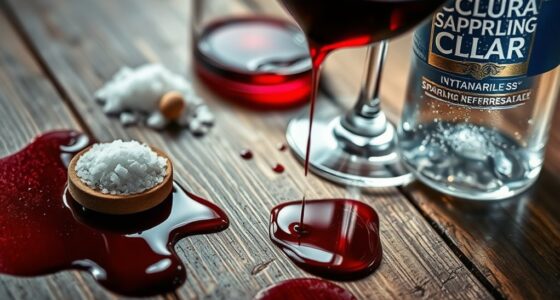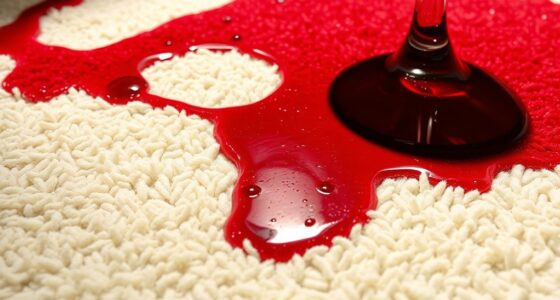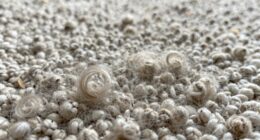To remove rust stains from concrete surfaces, start by cleaning the area to remove debris. You can use natural methods like lemon juice, vinegar, or a baking soda and vinegar mixture for surface stains. For tougher stains, try chemical rust removers like CLR or oxalic acid, ensuring you wear gloves. Always test a small area first. Protect your concrete in the future, and you’ll want to know more about effective maintenance techniques.
Key Takeaways
- Assess the rust stain’s depth to determine if surface cleaning or deeper treatment is necessary before starting the removal process.
- Use natural methods like lemon juice, vinegar, or baking soda to scrub the rust stains gently.
- For tougher stains, consider chemical rust removers like CLR or specialized products designed for concrete surfaces.
- Always test any cleaning solution on a small, inconspicuous area to avoid damaging the concrete.
- Apply a sealant after cleaning to protect the surface from future rust stains and moisture penetration.
Understanding Rust Stains on Concrete
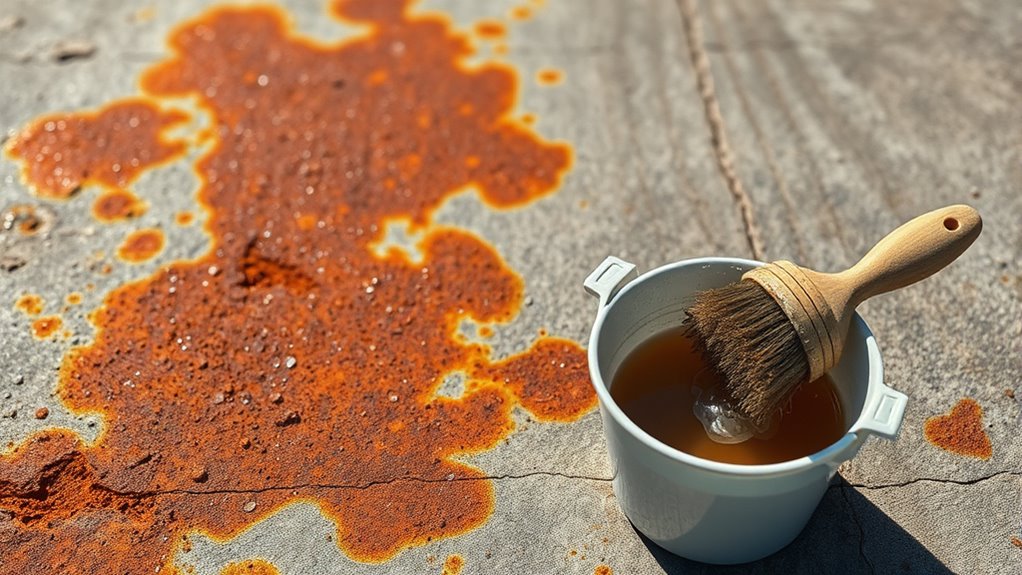
When you notice rust stains on your concrete surfaces, it’s important to understand their underlying causes. Rust forms when iron reacts with oxygen and moisture, creating those reddish-brown stains.
Understanding the causes of rust stains on concrete is essential for effective maintenance and preservation of its appearance.
If you’ve left metal furniture or tools on the concrete, they might seep into the pores when wet, leading to discoloration. Also, water from lawn irrigation systems can contain iron, contributing to rust over time. Iron-rich water can significantly increase the likelihood of rust stains forming on your concrete surfaces.
Cracks in your concrete allow moisture to penetrate, which can corrode embedded rebar and create stains. Additionally, poorly compacted concrete can let moisture in, exacerbating the problem.
Recognizing these sources helps you address rust stains effectively and maintain your concrete’s appearance.
Preparing for Rust Removal
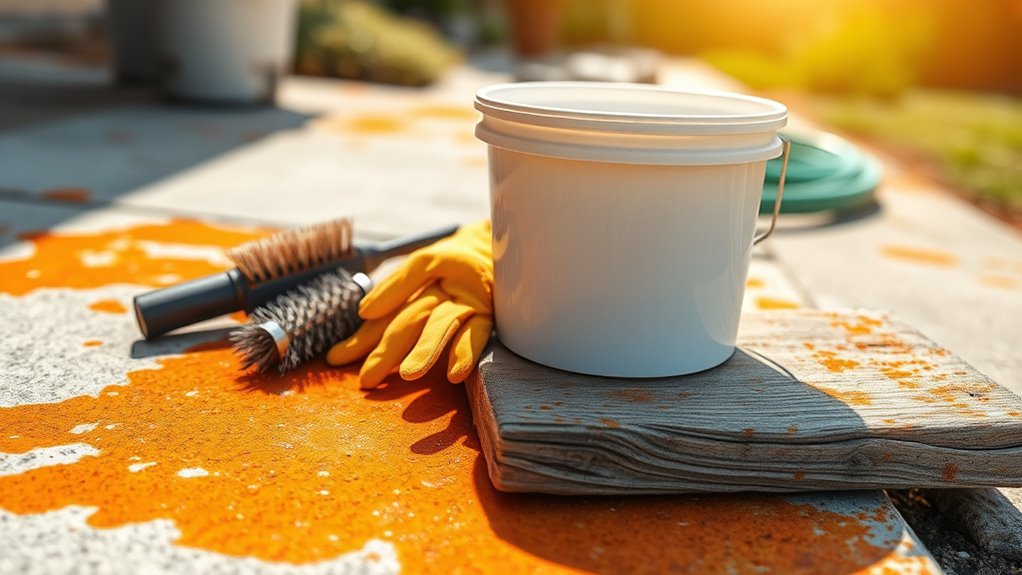
Before diving into rust removal, it’s crucial to prepare the area and gather all necessary tools and materials. Start by determining the extent of the stain—check if it’s surface-level or deeper due to rebar corrosion.
Next, gather your tools: gloves, safety goggles, scrub brushes, and a water hose. Make certain you wear protective clothing, including rubber gloves and a mask, especially when using chemicals.
Clear the concrete surface of any debris or dirt to make your work easier. If you’re working indoors, confirm there’s good ventilation to avoid inhaling fumes. Rust stains can be unsightly and challenging to remove, so proper preparation will ensure a more effective cleaning process.
Finally, consider covering surrounding surfaces to protect them from any chemical runoff during the cleaning process. You’re now ready to tackle those rust stains safely and efficiently!
Natural Methods for Rust Removal
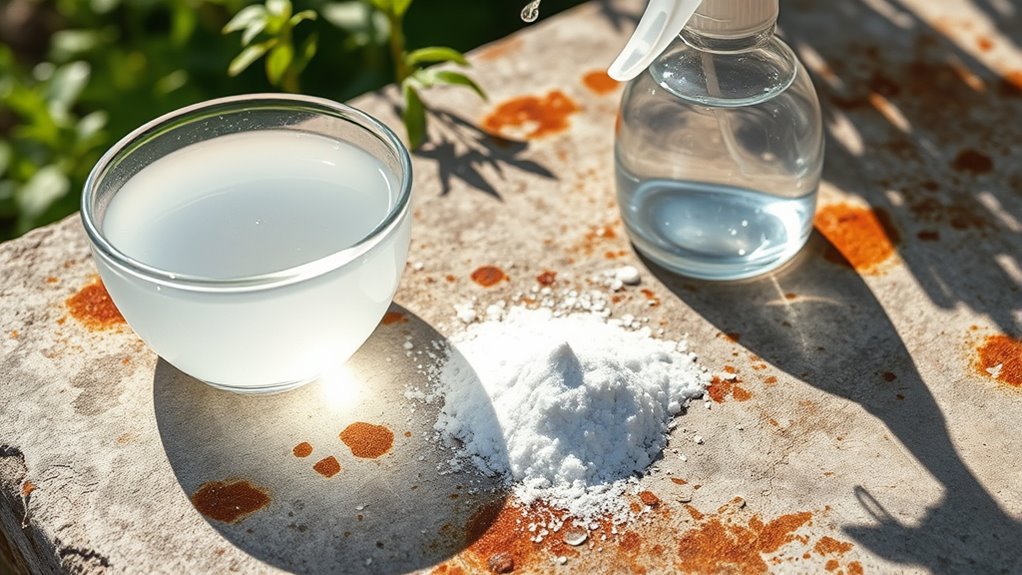
Natural methods for rust removal can be surprisingly effective and environmentally friendly, making them a great choice for tackling those pesky stains on concrete surfaces.
Lemon juice and white vinegar are excellent options due to their natural acidity, providing immediate results on newer stains. You can even dissolve vitamin C tablets in warm water for a gentle approach. For added abrasiveness, mixing baking soda with vinegar can boost effectiveness. Alternatively, Coca-Cola’s phosphoric acid can help with minor rust stains.
Start by cleaning the surface, then apply your chosen method directly to the stain and let it sit for about 10 minutes before rinsing with warm, soapy water. It’s important to note that rust stains can originate from exposed steel rebar within damaged concrete.
Always test on a small area first to prevent any concrete damage.
Chemical Methods for Rust Removal
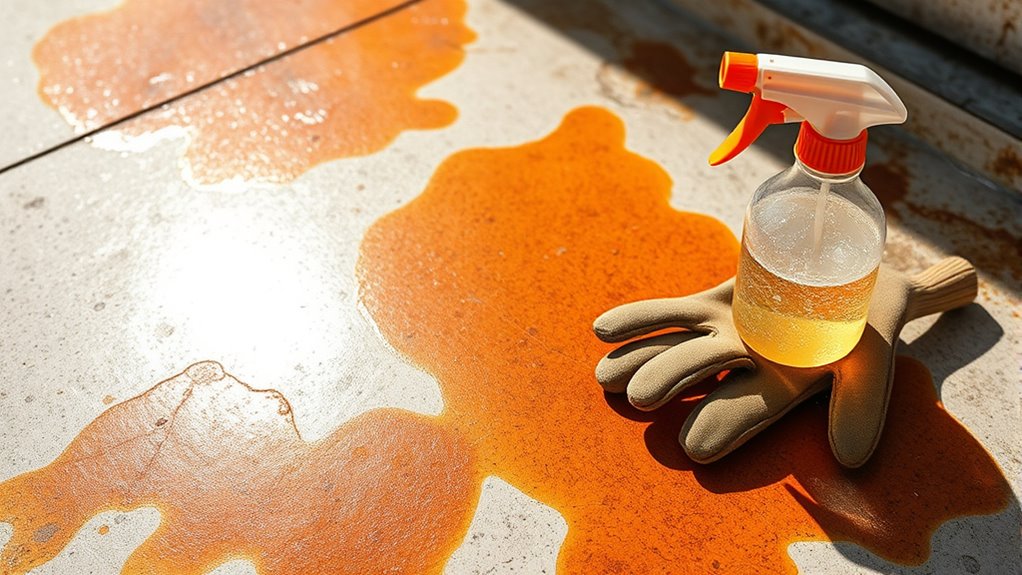
Chemical methods for rust removal offer a powerful solution for tackling stubborn stains on concrete surfaces. You can choose from various chemical rust removers, including oxalic acid and trisodium phosphate, which effectively dissolve rust. These products are user-friendly and can be applied with a brush or sprayer. Remember to wear protective gear like gloves and goggles to guarantee safety. Muriatic acid is another option, but it’s highly corrosive, so handle it with caution. Specialized products like Concrete Rust Remover work quickly, often within 15 minutes, and are safe for most concrete surfaces. Using acid/chemical wash prevents proper staining of concrete, so consider this factor before proceeding. CLR is also effective and less caustic, making it a convenient choice. Always test a small area first to avoid unwanted reactions.
Equipment Needed for Effective Cleaning
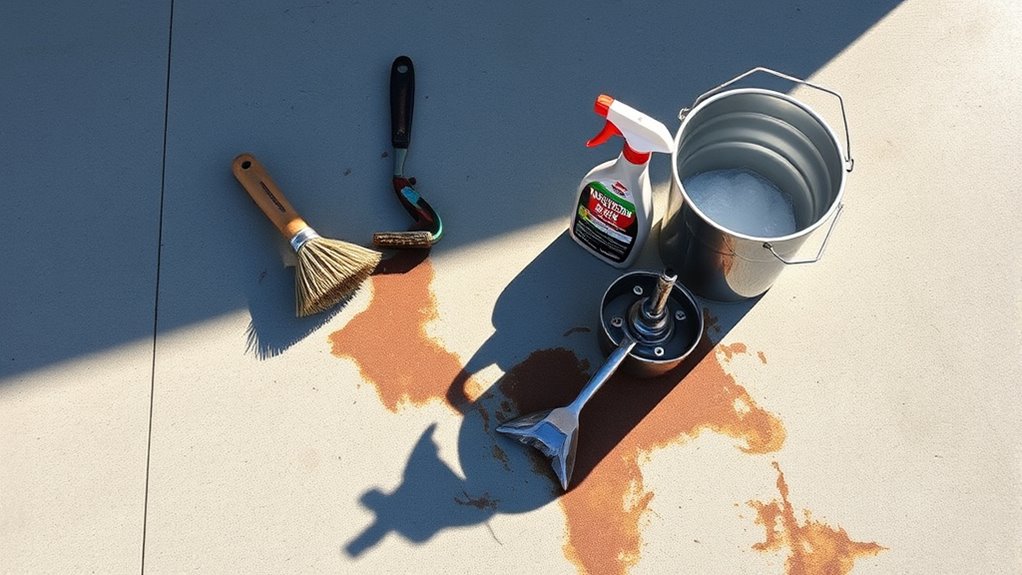
Having the right equipment is vital for effectively removing rust stains from concrete surfaces.
Start with a power washer or high-pressure hose to rinse off dirt and debris. You’ll also need protective gear, like latex gloves, safety goggles, and dust masks, to safeguard against chemicals and dust. Additionally, it’s important to protect surrounding areas with plastic sheets to prevent chemical damage.
Use trigger or pump sprayers for applying rust stain removers. Stiff scrubbing brushes are essential for tackling stubborn stains, providing the necessary mechanical abrasion.
Make sure you have a hose attached to a water source for thorough rinsing. Remember to cover surrounding areas with plastic sheets to prevent chemical damage.
Alternative Methods to Consider
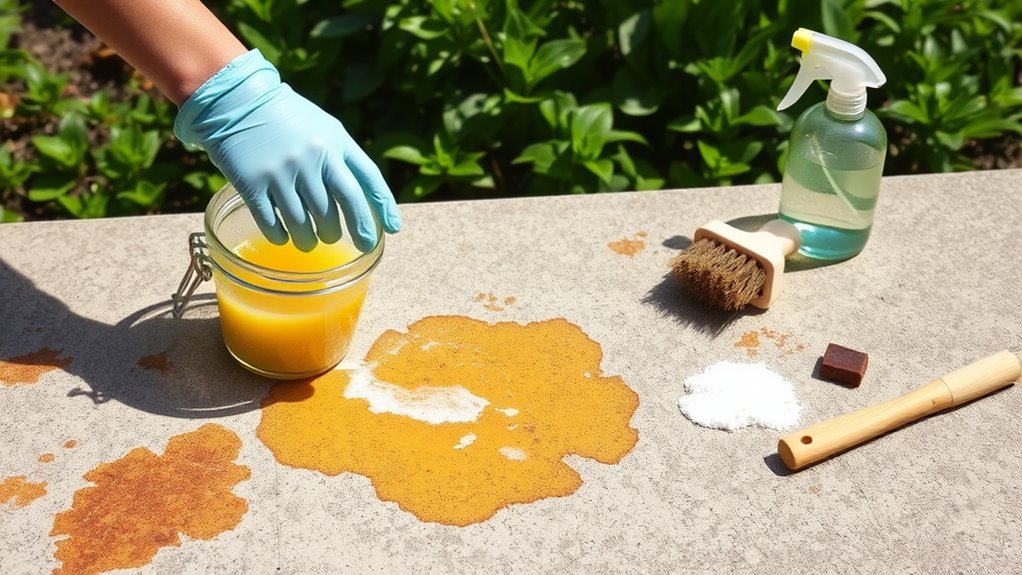
If you’re looking for effective ways to tackle rust stains on concrete, several alternative methods can help.
Household products like lemon juice and white vinegar work well for minor stains, thanks to their acidic properties. You can also dissolve vitamin C tablets in water for a non-toxic solution, as vitamin C is effective in removing rust stains from various surfaces.
Combining baking soda with vinegar boosts abrasiveness, making scrubbing easier. For a safer option, consider using natural citrus-based cleaners.
Surprisingly, Coca-Cola can also be effective due to its phosphoric acid content.
If you’re open to stronger solutions, oxalic acid and trisodium phosphate are powerful alternatives but require caution.
Always test any solution in an inconspicuous area first to verify it won’t damage your concrete surface.
Prevention and Maintenance Tips
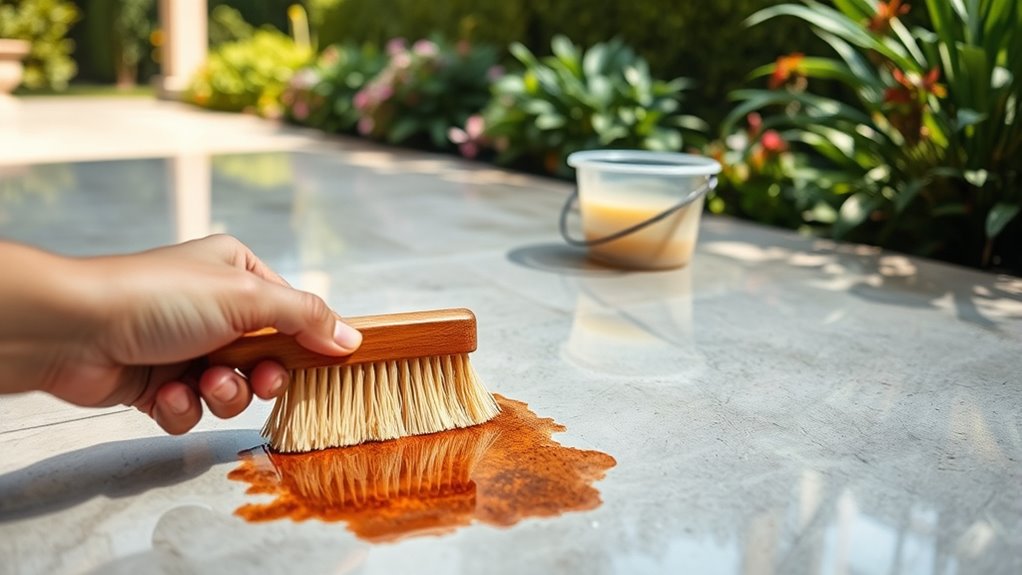
To keep rust stains at bay on your concrete surfaces, taking proactive measures is vital. Start by applying high-quality sealants to create a protective barrier that prevents moisture and rust from penetrating. Additionally, applying a protective sealant helps to reduce the likelihood of permanent staining on surfaces.
Regular maintenance is important, so inspect your surfaces frequently and address any stains immediately. Trim nearby vegetation to reduce moisture accumulation, and guarantee your sprinkler systems don’t spray directly onto concrete. Implement landscaping solutions to divert water away from these surfaces. Avoid direct contact between metal objects and concrete, and consider using rust inhibitors on metal fixtures.
Regularly clean your concrete with soap and water to maintain its appearance and prevent stains from forming in the first place.
Frequently Asked Questions
Can Rust Stains Damage Concrete Surfaces Permanently?
Yes, rust stains can damage concrete surfaces permanently.
If you don’t address stains quickly, they can penetrate deeply, causing discoloration and surface erosion. Harsh removal methods might further erode the concrete, leading to lasting damage.
To protect your concrete, you should regularly clean and seal it, and remove any rust promptly. By doing this, you can maintain its integrity and appearance, preventing long-term issues caused by rust stains.
How Long Does It Take to Remove Rust Stains?
Isn’t it amusing how rust stains seem to think they’re permanent fixtures?
You’ll find that removing them can take anywhere from 30 minutes to several hours, depending on their stubbornness. For minor stains, you might be in and out in an hour, but tougher ones? Well, they love to linger, often requiring multiple treatments.
Is It Safe to Mix Different Cleaning Solutions?
Mixing different cleaning solutions isn’t safe. You risk creating toxic gases that can harm your health, like chloramines from bleach and ammonia.
Certain combinations, like bleach and vinegar, release chlorine gas, which can irritate your lungs and skin.
Always store cleaners separately to avoid accidents, and use eco-friendly products whenever possible.
If you need to combine cleaners, make sure to research their compatibility first to keep yourself safe and healthy.
What Should I Do if Rust Stains Reappear?
When rust stains reappear, it’s like a ghost haunting your concrete.
First, check for sources like metal furniture or rusty tools lurking around. Fix any leaks and improve drainage to keep things dry.
Regularly apply sealants to protect your surfaces. Don’t forget to keep cleaning up debris and consider using non-metal alternatives.
Staying proactive will help keep those stubborn stains at bay, ensuring your concrete looks its best for longer.
Are There Eco-Friendly Rust Removal Options Available?
Yes, there are plenty of eco-friendly rust removal options available.
You can use household items like lemon juice or white vinegar, which are effective and safe. Just pour them on the rust stain, let them sit, then scrub and rinse.
If you prefer commercial products, look for those with biodegradable ingredients. These options not only help you tackle rust but also minimize environmental impact.
Plus, they’re often cheaper than harsh chemical cleaners!
Conclusion
By tackling rust stains promptly, using natural or chemical methods effectively, and maintaining your concrete surfaces, you can keep your space looking fresh and clean. Remember to prepare your area, gather the right equipment, and explore alternative solutions if needed. With a little effort and care, you’ll not only remove unsightly stains but also prevent future damage. So, take action today, stay proactive in your maintenance, and enjoy a rust-free concrete surface for years to come!




